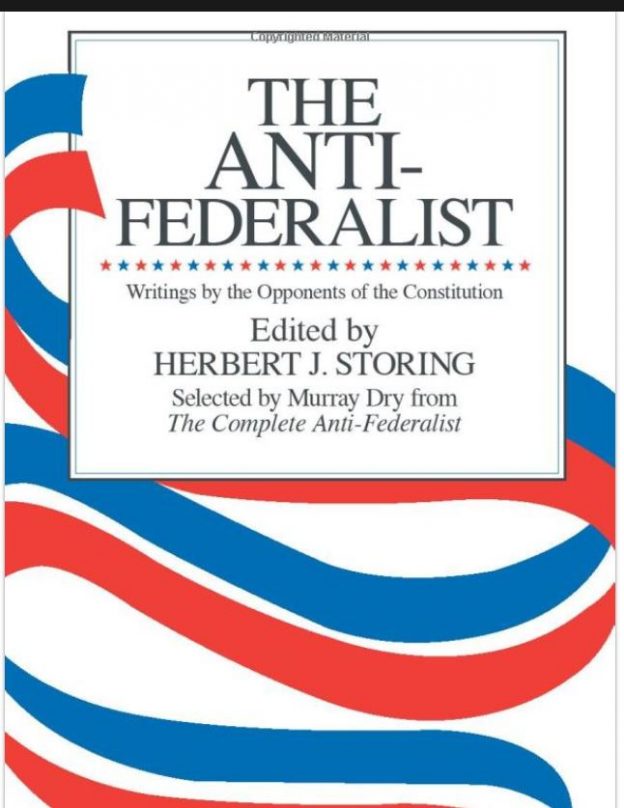On the eve of the federal convention, and following its adjournment in September of 1787, the Anti-Federalists made the case that the Constitution makers in Philadelphia had exceeded the mandate they were given to amend the Articles of Confederation, and nothing more. The Federal Constitution augured ill for freedom, argued the Anti-Federalists. These unsung heroes had warned early Americans of the “ropes and chains of consolidation,” in Patrick Henry’s magnificent words, inherent in the new dispensation.
After 200 years of just such “consolidation”—in the magisterial “Liberty, Order, And Justice: An Introduction to the Constitutional Principles of American Government”—constitutional scholar James McClellan distilled the Anti-Federalist argument with the respect it deserves.
As “strong advocates of States’ Rights,” Anti-Federalists held that “self-government, independence, and individual liberty were best protected at the local level. A distant and powerful central government,” the kind cooked up at the Philadelphia convention, was anathema to these “cherished values.” To that end, Anti-Federalists fought to preserve the “loose-knit relationship” that had existed between the “Confederation government and the States.”
Should the Federal Constitution be ratified, there would be “no checks, no real balances,” thundered Patrick Henry. Instead, the country would live under a “powerful and mighty empire.” Writing under the assumed name “Agrippa,” yet another Anti-Federalist scoffed at the idea of an enormous “uncompounded republic,” “containing 6 million white inhabitants,” all “reduced to the same standard of morals or habits and of laws.” This “in itself is an absurdity,” mocked “Agrippa.”
The Tower of Babel that is 21st century America is home not to 6 but 317 million alienated, antagonistic individuals, diverse to the point of distrust. These modern-day Americans, some of whose ancestors were brought together by a “profound intellectual and emotional attachment to individual liberty,” possess little by way of “social capital” to unify them. Surveys say Americans today avoid one another and hunker down unhappily in front of the TV, instead. This would have hardly surprised “Agrippa.”
So, too, did Anti-Federalists predict the problem of representatives who had been imbued with excessive power. “Once elected, representatives would be far from home, comfortable in their jobs, enjoying a big salary … living in some distant, yet-to-be-built city far removed from the watchful eye of the people they represented.”
Sound familiar?
From “Brutus” came perhaps the most “perceptive and far-reaching examinations of congressional power from the Anti-Federalist perspective.” Writing in the New York Journal, “Brutus” observed that “the ‘most natural and grammatical construction’ of the General Welfare Clause in Article I is that it authorizes the Congress ‘to do anything which in their judgment will tend to provide for the general welfare, and this amounts to the same thing as general and unlimited power of legislation in all cases.”
“If only the high-minded Framers had written the Constitution with crooks in mind,” lamented this column in 2008.“Brutus” was not nearly as charitable. Bitterly did he complain about a Constitution that was “written ‘in general and indefinite terms, which are either equivocal, ambiguous, or which require definition.'”
The Commerce Clause has given us the Patient Protection and Affordable Care Act. “ACA,” or “Obamacare,” forces 21st century Americans to purchase the federal government’s version of health insurance, or risk punishment. The Clause was the focus of scathing Anti-Federalist critique. “What is meant by ‘the power to regulate?” they demanded to know. “What, precisely, is ‘commerce'”? The new Constitution, argued the prescient Anti-Federalists, is mum on these matters, providing little by way of precision in definition.
Brilliant too was “Brutus” in his prediction that, if instituted, the “new system of government” would see the Federal judiciary “swallow up the State courts.” Back then, “Brutus” saw Article III, Section 2, of the Constitution as vesting the judicial branch with the kind of power that would bring about “the entire subversion of the legislative, executive, and judiciary power of the individual states.”
As the saying goes, “a prophet is not without honor save in his own country.”
To observe Obama (and predecessor) in action is to realize that Massachusetts delegate Elbridge Gerry and New York Anti-Federalist “Cato” were prophets who deserve a lot more honor in their own country. Both forewarned of an imperial presidency in the making. “‘The president,’ wrote “Cato,” has so much power that his office ‘differs very immaterially from the establishment of monarchy in Great Britain.'”
Indeed, President Barack Obama habitually “uses executive orders to circumvent federal legislation.” He exempts his “friends or political cronies” from oppressive laws his subjects must obey. And he orders the suspension of “duly enacted [immigration] law”—even “barring enforcement”—because he does not like the law.
A propagandized population has a hard time choosing worthy heroes. It is high time Americans celebrate the Anti-Federalists, for they were correct in predicting the fate of freedom after Philadelphia.
To deny that the Anti-Federalists were right is to deny reality.
Having prophesied that Philadelphia was the beginning of the end of the freedoms won in the American Revolution, our Anti-Federalist philosophical fathers fought to forestall the inevitable. They failed.
©2013 By ILANA MERCER
WND, Economic Policy Journal, American Daily Herald
& Praag.org.
December 6
CATEGORIES: Constitution, Decentralization, Democracy, Federalism, Founding Fathers, History, Justice, Law, Political Philosophy, States' Rights, The State & Statism

 print
print